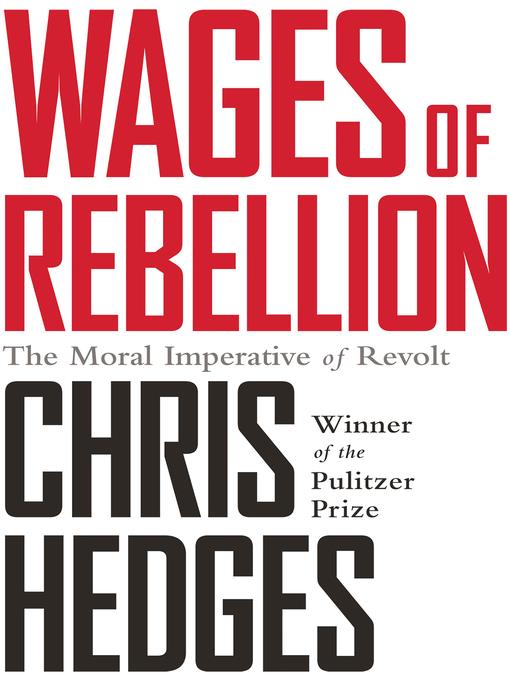
Wages of Rebellion
کتاب های مرتبط
- اطلاعات
- نقد و بررسی
- دیدگاه کاربران
نقد و بررسی

March 23, 2015
It’s time to eradicate “the pestilence of corporate totalitarianism,” according to this lurid anticapitalist manifesto. Likening global capitalism to the Beast of the book of Revelation, Pulitzer Prize–winning ex-New York Times correspondent Hedges (War is a Force That Gives Us Meaning) anticipates a nigh-apocalyptic future of deepening poverty and exploitation, ecological destruction, omnipresent surveillance, “looting, pillaging, and killing,” and perhaps even a reprise of the Black Death. Our only hope, he maintains, is to revive a revolutionary tradition that he omnidirectionally yokes to such diverse figures as Thomas Paine, Karl Marx, and Julian Assange. The latter-day rebels that he profiles are a tamer collection of Occupiers and hacktivists who mainly espouse Hedges’ own preference for non-violence. Hedges’s usual acute (if one-sided) reportage is on display—lengthy sections on unfairly prosecuted activists and the harshness of America’s penal system hit hard—but is ill-served by his lack of perspective and exaggeration of every injustice into unreformable tyranny. He suggests no substantive alternative beyond an undefined “socialism,” nor any coherent politics besides a “sublime madness” of imaginative zealotry. Hedges’s jeremiad will please left-wing romantics, but other readers may find it less inspiring. Agent: Lisa Bankoff, ICM Partners.

March 15, 2015
A call for a new American revolution.Pulitzer Prize-winning journalist Hedges (The World As It Is: Dispatches on the Myth of Human Progress, 2011, etc.) continues his exhortation for nonviolent rebellion in eight feisty essays drawn from or expanding upon his weekly column for Truthdig. Without a revolution, he claims, we face a dire future, "the culmination of a 500-year global rampage of conquering, plundering, and polluting the earth" by economic and military elites. Among many incendiary claims, he asserts that climate change will lead to famine, the spread of deadly diseases, and "levels of human mortality that will dwarf those of the Black Death," a plague, the author warns, that could re-emerge. As a scholarship student at an exclusive boarding school, Hedges confesses that he developed a virulent "hatred of authority [and] loathing for the pretensions, heartlessness, and sense of entitlement of the rich," whom he sees as democracy's enemies. He decries the nation's history of violence not only in wars, slavery, and persecution of indigenous peoples, but also in an astonishingly high rate of incarceration, especially of black men; its refusal to enact gun control laws, even after tragic school shootings; and its vengeance against protestors, such as members of the Occupy movement, whom he repeatedly cites as models of moral courage. He celebrates whistleblowers Julian Assange, Chelsea Manning, and Edward Snowden for raising awareness of the government's duplicity and "wholesale surveillance," which the author believes inevitably will be used to quash dissent: "This information waits like a dormant virus inside government vaults to be released against us." Despite his ominous predictions, Hedges sees a popular revolt imminent because "ideas used to prop up ruling elites" are being discredited, and "the vision of a new society" is taking hold in the popular imagination. Like early-20th-century muckraking journalists and, more recently, I.F. Stone, Hedges makes a boisterous, outspoken contribution to revolutionizing the national conversation.

April 15, 2015
Hedges is breathless, brilliant, and angry. His latest cri de coeur is like his previous books (Days of Destruction, Days of Revolt; The World As It Is, for example), a complex, not always easy-to-follow disquisition on why we are all going to hell in a hand basket. He lists corruption, prejudice, illiteracy, misguided beliefs about education, crumbling infrastructures, corroding morality, and global warming as just a few of the horrors we're facing. Hedges is a practiced polemicist, bringing to bear (sometimes all at once) his training as a reporter, a theologian, a passionate reader of canonical books (Herman Melville's Moby-Dick is a favorite), a disgusted observer of popular culture, and his long-standing friendships with dissidents such as Noam Chomsky and Ralph Nader as he tells readers why it's time for people to take things into their own hands. (He doesn't quite say how, but he does admire the recent "Occupy" movement.) VERDICT People tend to either love or hate Hedges, but librarians in public, academic, and relevant special libraries will want this book because, even if the revolution isn't about to happen, Hedges's voice is an important one.--Ellen Gilbert, Princeton, NJ
Copyright 2015 Library Journal, LLC Used with permission.

























دیدگاه کاربران